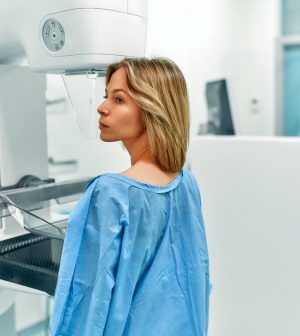- Could Your Grocery Store Meat Be Causing Recurring UTIs?
- Are You Making This Expensive Thermostat Error This Winter?
- Recognizing the Signs of Hypothyroidism
- 10 Strategies to Overcome Insomnia
- Could Artificial Sweeteners Be Aging the Brain Faster?
- Techniques for Soothing Your Nervous System
- Does the Water in Your House Smell Funny? Here’s Why
- Can a Daily Dose of Apple Cider Vinegar Actually Aid Weight Loss?
- 6 Health Beverages That Can Actually Spike Your Blood Sugar
- Treatment Options for Social Anxiety Disorder
AI Plus Mammograms Might Boost Breast Cancer Detection

Artificial intelligence (AI) can improve doctors’ assessments of mammograms, accurately detecting even the smallest breast cancers with fewer scary false positive readings, a new study shows.
AI-assisted mammography detected significantly more breast cancers, with a lower false-positive rate, than doctors assessing mammograms on their own, researchers reported June 4 in the journal Radiology.
Nearly 21% fewer women had to come back for a follow-up mammogram when AI helped doctors analyze breast imaging, researchers found.
“We believe AI has the potential to improve screening performance,” said researcher Andreas Lauritzen, a post-doctoral student at the University of Copenhagen in Denmark.
For the study, researchers had human radiologists read the mammograms of nearly 61,000 Danish women ages 50 to 69 who were screened between October 2020 and November 2021, before AI was available for this purpose.
Then, between November 2021 and October 2022, the team had an AI program perform the first analysis of breast screenings for more than 58,000 women. Mammograms deemed normal by AI were then given a second going-over by human radiologists, to confirm the program’s analysis.
Screening assisted by AI detected more breast cancers (0.8% versus 0.7%) and had a lower false-positive rate (1.6% versus 2.4%), results show.
The positive predictive value of AI-assisted screening — the odds that woman truly had breast cancer after a positive result — also was higher, 34% versus 23%, researchers found.
AI also helped doctors find more tumors 1 centimeter or less in size, 45% versus 37%.
AI assistance also reduced the reading workload of radiologists by more than 33%, which is important in making mammograms widely available, researchers said.
“Population-based screening with mammography reduces breast cancer mortality, but it places a substantial workload on radiologists who must read a large number of mammograms, the majority of which don’t warrant a recall of the patient,” Lauritzen said in a journal news release.
However, the researchers said more study is needed to evaluate the long-term outcomes of women, as well as to make the AI even more accurate for individual women.
“Radiologists typically have access to the women’s previous screening mammograms, but the AI system does not,” Lauritzen said. “That’s something we’d like to work on in the future.”
More information
The National Cancer Institute has more about mammograms.
SOURCE: Radiological Society of North America, news release, June 4, 2024
Source: HealthDay
Copyright © 2026 HealthDay. All rights reserved.










